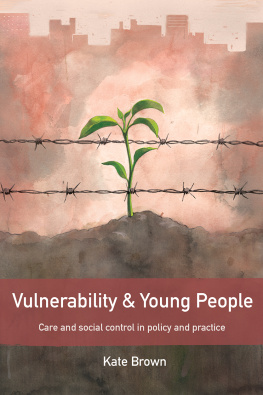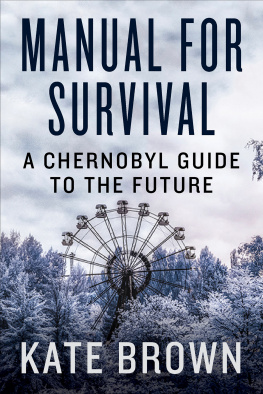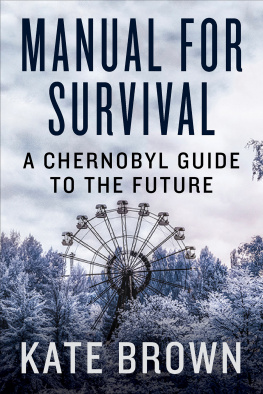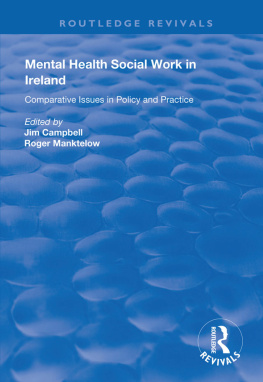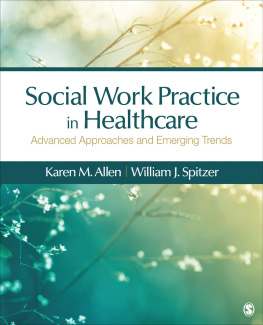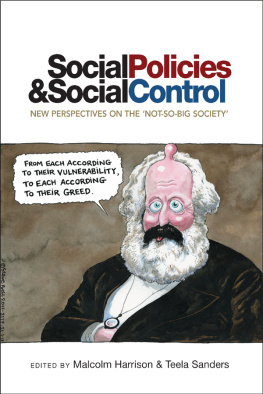
First published in Great Britain in 2015 by
Policy Press University of Bristol 1-9 Old Park Hill Bristol BS2 8BB UK Tel +44 (0)117 954 5940 e-mail
North American office: Policy Press c/o The University of Chicago Press 1427 East 60th Street Chicago, IL 60637, USA t: +1 773 702 7700 f: +1 773-702-9756
Policy Press 2015
British Library Cataloguing in Publication Data
A catalogue record for this book is available from the British Library
Library of Congress Cataloging-in-Publication Data
A catalog record for this book has been requested
ISBN 978-1-4473-1817-0 Hardcover
ISBN 978-1-4473-1822-4 ePub
ISBN 978-1-4473-1821-7 Mobi
The right of Kate Brown to be identified as author of this work has been asserted by her in accordance with the Copyright, Designs and Patents Act 1988.
All rights reserved: no part of this publication may be reproduced, stored in a retrieval system, or transmitted in any form or by any means, electronic, mechanical, photocopying, recording, or otherwise without the prior permission of Policy Press.
The statements and opinions contained within this publication are solely those of the author and not of the University of Bristol or Policy Press. The University of Bristol and Policy Press disclaim responsibility for any injury to persons or property resulting from any material published in this publication.
Policy Press works to counter discrimination on grounds of gender, race, disability, age and sexuality.
Cover design and image: Kenn Goodall
Readers Guide
This book has been optimised for PDA.
Tables may have been presented to accommodate this devices limitations.
Image presentation is limited by this devices limitations.
Contents
I am lucky to have had support from lots of people to produce this book. I am deeply grateful to Malcolm Harrison, who nurtured my interest in vulnerability and whose expertise and generous engagement with my work was extremely formative. John Hudsons guidance and mentorship have been invaluable, especially in writing stages. Teela Sanders encouraged me from the beginning and helped keep momentum going. I am also very fortunate that colleagues in the Department of Social Policy and Social Work at the University of York have supported me in other areas of academic work, which has been so important, thank you in particular to Lisa OMalley, Sharon Grace and Peter Dwyer.
The research study was funded by Leeds Universitys School of Sociology and Social Policy, and staff and students there provided valuable intellectual and practical input. Contemplating vulnerability with a range of people contributed to the development of ideas, at conferences and events, and via comments on earlier work. John Flint, Nick Emmel, Jo Phoenix, Kathryn Ecclestone, Carol-Ann Hooper and Rachael Dobson deserve special mention but thank you to others who shared thoughts and suggested improvements. Valued support has come from the publishers. I am also grateful to Matthew Bell for help with editing and historical research, and to Kenn Goodall for his excellent cover design.
Special thanks go to the young people who participated in the study. The experiences they shared were not always easy to discuss, and I hope that the way their voices appear in the book does justice to the openness, tenacity, goodwill and humour with which they told their stories. The research would not have been possible without the dedication and support of colleagues involved in local services, who allowed me to work alongside them at a time of significant struggles with resources. I do not include names for reasons of confidentiality but really appreciate their assistance and interest in the research. Thank you also to key informants who shared their time and expertise so willingly.
Friends and family helped me to go the distance. Ruth Patrick always helped make sense of things. For good times and troubles shared along the way, thanks to Scott Brown, Kate Jones, Anna Shemeld, Naomi Hersey, the Sharkeys, and friends in Leeds. For their never-faltering care and concern, thank you to my parents, Liz and David Brown. Finally, a massive thank you is due to Chris Sharkey, for his patience, encouragement and partnership in the struggles and adventures of producing things.
When Chris was 10 years old, he was taken to Pakistan by his family, where he was regularly beaten by his uncle for a period of six years. He returned to England to live with his parents and shortly afterwards became homeless after fleeing from his abusive father who had threatened to kill him. At age 17, he had recently secured the keys to his own social housing tenancy in a large inner-city housing estate and was being supported by a voluntary sector service for vulnerable children. When asked about his vulnerability he responded:
People have even more difficulties than me. This might not be such a big thing. Ive seen other people have more difficulties even worser than these. Yeah its difficult, but not difficult difficult, Id say.
Alicia had become involved in heroin use and selling sex at the age of 14, through an older boyfriend. When she was 15 she slept in a tent for a month after running away from her care home because of bullying. She had been prosecuted criminally a number of times, for various offences that included stealing tanning wipes from a chemist. Alicia no longer took heroin or sold sex but still used other drugs sometimes, and explained her vulnerability as follows:
If my mates are doing like M-CAT [mephedrone] or something like that, Im easily persuaded to take it, if theyre going oh come on, take it. But then I think in my head thats my decision, everyone makes decisions like that every day, but it doesnt mean youre vulnerable, it just means that youve made a decision to do something like that.
While vulnerability would seem appealing as a common-sense concept to help make sense of these stories and accounts, a number of tensions and policy matters are raised by the young peoples experiences and views. Those who are supposedly vulnerable may be resistant to being classified in this way. At the same time as being seen as vulnerable, they may be transgressive or criminal, raising the thorny issue of whether support or discipline is the most appropriate response. Attention to vulnerability opens up difficult questions about deservingness, human agency, care and social control. This book addresses and unpicks some of these complexities. It takes the idea of vulnerability as a starting point to explore what it means to be vulnerable, what the conceptual dimensions of vulnerability might be and the implications of the notion as a governance mechanism in contemporary society.
Speaking to narratives of empathy and inclusion, policies and practices that seek to help those who are considered to be vulnerable have strong moral overtones. At first glance, such initiatives seem to support the pursuit of social justice and the protection of those who need it most, but closer attention to the prioritisation and exceptional treatment of vulnerable citizens reveals a more complicated picture. A shadow concept of risk, vulnerability is frequently drawn on across policy, practice and research and in everyday life, yet has received relatively little scrutiny. This lack of critical attention seems surprising given that ideas about vulnerability shape justifications of state intervention in citizens lives, influence allocations of resources and play a role in defining social obligations.


